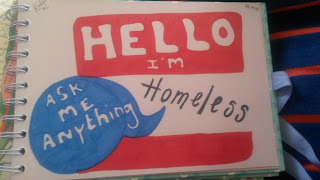Transatlantic Practice Exchange Day Five: Strengths Based Training
For the next two weeks I’m in Grand Rapids, Michigan, as part of the Transatlantic Practice Exchange, find me on twitter @ruthfranciszka and follow #homelesslearning
Dwelling on consumer’s pasts and hardships promotes “an image of themselves as helpless in the past which becomes the basis for fault-finding and continued helplessness in the future” (Wolin and Wolin 1993)
Dwelling on consumer’s pasts and hardships promotes “an image of themselves as helpless in the past which becomes the basis for fault-finding and continued helplessness in the future” (Wolin and Wolin 1993)
When I started on the exchange I wanted to learn how to take
the idea of Strengths Based Case Management beyond an ethos and set of values and
translate it into practice that makes a real difference and truly values the
autonomy, self-determination and assets of the people we work alongside.
There could be no more fitting placement to learn this than
Community Rebuilders. For them being strengths based is a way of life. I was
lucky enough to attend some Strength’s Based refresher training with their longest
serving staff.
I was struck by the fact that even the way the training was
organised was strength’s based. Having recognised that there had been a lot of
growth and an influx of new staff into the organisation, the directors saw an opportunity
to utilise the strengths of established team members; to bring them together to
congratulate them on their service to the organisation and empower them to positively
influence and lead new team members.
We split into groups and discussed the principles of
Strength’s Based Case Management; Rachel and I focussed on:
“Trauma, abuse,
illness and struggle may be injurious, but they may also be sources of
challenge and opportunity”
…we discussed the
actions that promote it:
“When consumers are
struggling to meet life’s challenges you are able to point out competencies,
resilient and resourcefulness”
…we discussed the ‘detours’ that workers can find themselves
taking that stop work with a client from being strengths based:
“I see ineffective
and unhealthy behaviours and use these to determine needs”
…and most importantly the practical tools that make it
possible, his made me realise that many of the practical tools we need are
already at hand: training we’ve received, rapport building, solution focussed
techniques, like asking the customer what would be useful for them to get out
of the session, action planning, goals setting, and the strengths of the people
around us.
The training was a forum for open discussion, a chance for
staff to honestly discuss the practicalities and difficulties of remaining
strengths based, Challenge and discussion was actively encouraged, but it’s evident
that the team work hard to ensure their commitment to the model never wavers.
As Executive Director, Vera Beech told me this week:
“Being strengths based is something you
have to practice every day”.
*Me and some of the Community Rebuilders Team having just completed our strengths based refresher training



Comments
Post a Comment